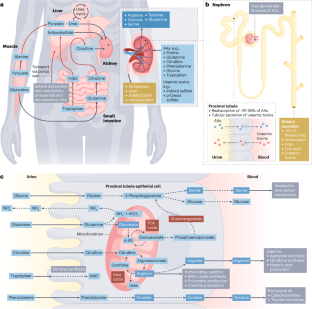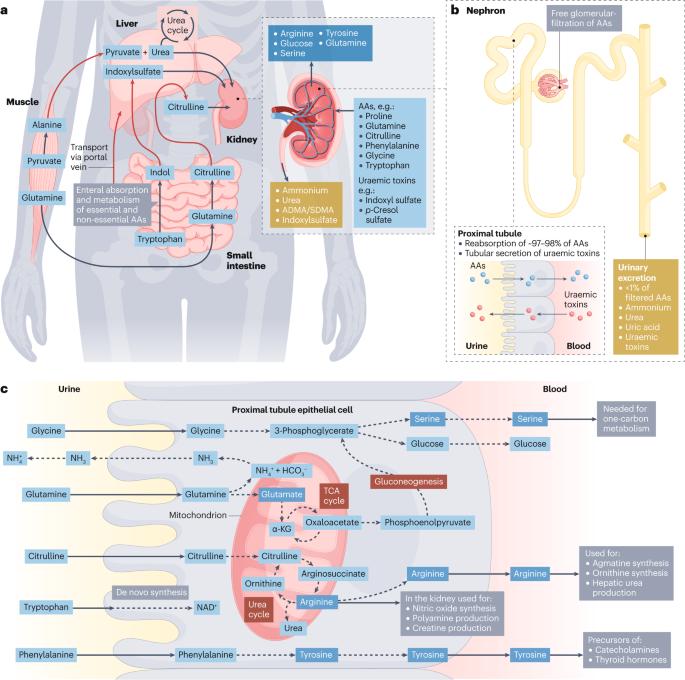肾脏健康和疾病中的氨基酸代谢
IF 28.6
1区 医学
Q1 UROLOGY & NEPHROLOGY
引用次数: 0
摘要
氨基酸可形成肽和蛋白质,因此被认为是构成生命的主要成分。肾脏在氨基酸的合成、降解、过滤、重吸收和排泄过程中发挥着重要作用,但这一作用却未得到充分重视。肾脏的作用是保留有用的代谢产物,同时排泄氨基酸代谢过程中可能产生的有害产物和废物。由肾脏转运体和酶组成的复杂网络引导着这些过程,并调节各种代谢物和氨基酸产物的竞争浓度。肾脏氨基酸代谢有助于糖元生成、氮清除、酸碱代谢以及为三羧酸循环和尿素循环中间产物提供燃料,因此是体内平衡的核心枢纽。相反,肾脏疾病会影响多种氨基酸的水平和代谢。在此,我们回顾了肾脏在氨基酸代谢中的作用,并描述了肾脏的不同疾病如何导致氨基酸代谢失常。进一步了解受疾病影响的代谢和交流途径可为肾脏疾病的发病机制提供新的机理认识,并有可能实现有针对性的饮食或药物干预。本文章由计算机程序翻译,如有差异,请以英文原文为准。


Amino acid metabolism in kidney health and disease
Amino acids form peptides and proteins and are therefore considered the main building blocks of life. The kidney has an important but under-appreciated role in the synthesis, degradation, filtration, reabsorption and excretion of amino acids, acting to retain useful metabolites while excreting potentially harmful and waste products from amino acid metabolism. A complex network of kidney transporters and enzymes guides these processes and moderates the competing concentrations of various metabolites and amino acid products. Kidney amino acid metabolism contributes to gluconeogenesis, nitrogen clearance, acid–base metabolism and provision of fuel for tricarboxylic acid cycle and urea cycle intermediates, and is thus a central hub for homeostasis. Conversely, kidney disease affects the levels and metabolism of a variety of amino acids. Here, we review the metabolic role of the kidney in amino acid metabolism and describe how different diseases of the kidney lead to aberrations in amino acid metabolism. Improved understanding of the metabolic and communication routes that are affected by disease could provide new mechanistic insights into the pathogenesis of kidney diseases and potentially enable targeted dietary or pharmacological interventions. The kidney has an important role in the handling of amino acids, facilitated by a complex network of kidney transporters and enzymes. This Review provides an overview of the role of the kidney in the synthesis, degradation, filtration, reabsorption and excretion of different amino acids and the relevance of these functions in the context of kidney physiology and disease.
求助全文
通过发布文献求助,成功后即可免费获取论文全文。
去求助
来源期刊

Nature Reviews Nephrology
医学-泌尿学与肾脏学
CiteScore
39.00
自引率
1.20%
发文量
127
审稿时长
6-12 weeks
期刊介绍:
Nature Reviews Nephrology aims to be the premier source of reviews and commentaries for the scientific communities it serves.
It strives to publish authoritative, accessible articles.
Articles are enhanced with clearly understandable figures, tables, and other display items.
Nature Reviews Nephrology publishes Research Highlights, News & Views, Comments, Reviews, Perspectives, and Consensus Statements.
The content is relevant to nephrologists and basic science researchers.
The broad scope of the journal ensures that the work reaches the widest possible audience.
 求助内容:
求助内容: 应助结果提醒方式:
应助结果提醒方式:


